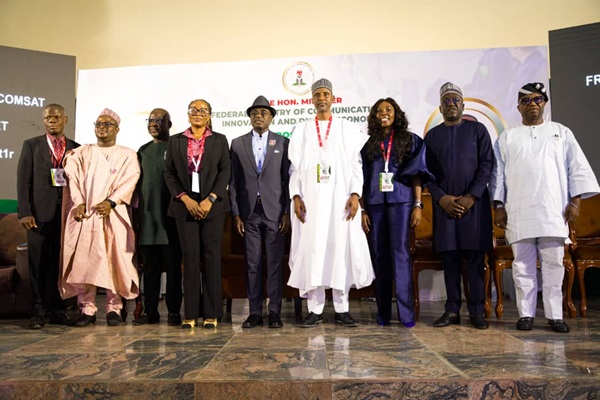
The Federal Government of Nigeria has called on all states and key stakeholders in the digital economy to harness the potential of artificial intelligence (AI) to drive economic growth, foster creativity and improve governance, ultimately contributing to national development.
The Minister of Communications, Innovation and Digital Economy, Dr. Bosun Tijani who is also chairman of the 12th Regular Meeting of the National Council on Communications, Innovation, and Digital Economy, made this call while delivering his keynote address in Makurdi, Benue State. The minister, who was represented by the permanent secretary, Engr. Faruk Yabo emphasised the importance of leveraging digital technologies for national development, as mandated by President Bola Tinubu.
“The mandate given to us by President Tinubu is to leverage digital technologies for national development,” Tijani said, highlighting the government’s commitment to ensuring that AI’s positive impacts benefit all Nigerians while mitigating any associated risks.
In his address, Tijani outlined the key objectives of the national council, which include promoting and developing digital infrastructure, identifying policy gaps and opportunities for AI adoption, showcasing innovative AI applications for sustainable development, and fostering collaborations among stakeholders from both the public and private sectors. These objectives reflect the government’s determination to position AI as a critical tool for the nation’s socio-economic growth.
The minister further noted that AI has the potential to revolutionise various sectors of the Nigerian economy, including healthcare, education, finance, and agriculture. However, he stressed that to fully harness the power of AI, Nigeria must establish a robust digital and IT infrastructure. This includes advanced computing facilities, data storage and management systems, cutting-edge networking infrastructure, specialised software and tools and, most importantly, skilled human resources.
Tijani also emphasised the importance of contributions from the council members, acknowledging that their expertise and insights would inform national strategies and initiatives aimed at developing a digital economy that benefits all Nigerians. He encouraged continued discussions among council members beyond the meeting, urging them to share knowledge and build a collaborative path toward a future driven by AI.
A significant point raised by the minister was the critical need for ease of access to the right of way (RoW) for telecommunication infrastructure deployment. He informed stakeholders that the federal government had recently approved the establishment of a special purpose vehicle (SPV) to build 90,000 km of fibre optic cables across Nigeria, with an estimated investment of over one billion US dollars. This initiative, according to Tijani, will prioritise the creation of an enabling environment for investment, supported by well-established policies and regulatory frameworks on the use of RoW for fibre optic infrastructure.
In addition to these initiatives, Tijani urged all policymakers, business leaders, and stakeholders to collaborate in establishing a strong infrastructure that will unlock the full potential of digital technologies, including AI, for national development. He also expressed gratitude to the governor of Benue State, Rev. Fr. Dr. Hyacinth Iormem Alia and the people of the state for their hospitality and support.
In his opening remarks, governor Alia praised the gathering for the 12th council meeting, describing it as a testament to Nigeria’s collaborative efforts aimed at transforming the country through digital innovation. He commended the discussions and decisions made towards making Nigeria the digital hub of Africa, asserting that nations that embrace digital innovation are always at the forefront of progress.
Governor Alia emphasiced the critical role of digitalication in economic transformation and the opportunities it provides for stakeholders to exchange ideas and best practices. He reiterated the importance of harnessing powerful technologies, such as AI, that are waiting to be fully utilized.
The Governor also acknowledged the administration of President Tinubu for its bold steps in fostering financial inclusion, supporting startups, and expanding digital infrastructure. He expressed confidence that technology’s transformative power could help build a prosperous future for Nigerians.
In a statement by the ministry’s deputy director of press and public relations, Kania Maliki Andeyaba, governor Alia highlighted that the council’s deliberations and outcomes are pivotal to unlocking new growth opportunities, with the continued support of President Tinubu’s administration. The governor emphasised the administration’s commitment to advancing digital innovation as a means to build a brighter future for Nigeria.
In her vote of thanks, the director of public relations and strategy (PRS), Mrs. Comfort H. Labirwa expressed gratitude to the governor, his cabinet and the people of Benue State for their hospitality. She also thanked the minister, permanent secretary, chief executive officers of agencies under the ministry, private sector representatives and civil society organisations for their contributions to making the event a success.
Labirwa urged all council members to intensify their efforts towards the full implementation of the initiatives and strategies discussed during the meeting, emphasising the importance of translating ideas into actionable steps that will drive the nation’s digital transformation.
The 12th Regular Meeting of the National Council on Communications, Innovation and Digital Economy marked a significant step towards realising Nigeria’s digital future. With a collective effort from all stakeholders, the country is poised to unlock the immense potential of AI and digital technologies for sustainable development.


